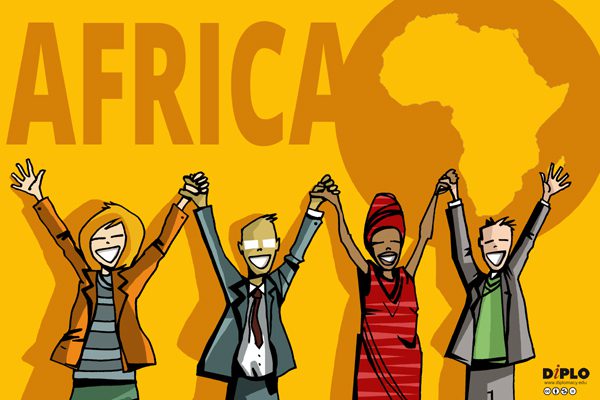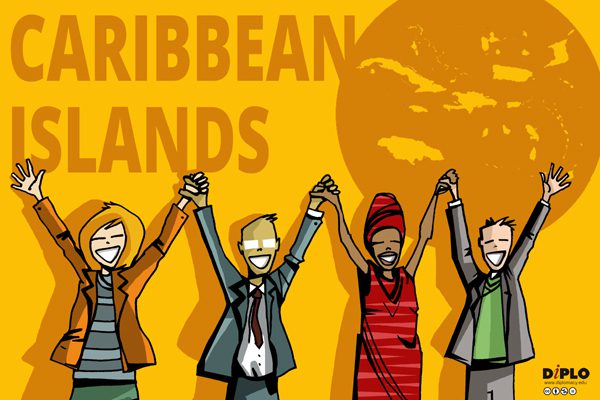Diplomacy of small states
The diplomacy of small states is a subset of diplomacy. It is sufficiently identifiable to warrant an examination on its own. At the same time, it also helps to provide an insight into the broader themes, objectives, and methods of diplomacy in general.
Small states form an integral part of the international order. About two-thirds of United Nations members fall into this category. They operate in the same broad political and economic environment as all other states. In their foreign policy, they pursue the same objectives of security, prosperity, and wellbeing of their citizens. They also conduct their diplomacy using the same diplomatic toolbox as larger states.
While all states share in the full definition of sovereignty and autonomy, certain characteristics influence how small states operate in the international system. They have a limited set of human and material resources to devote to the tasks of diplomacy. The range of issues they face is more limited. Yet, they are no less urgent or intense than that of larger states. The effects of their actions on the international order also tend to be more focused.
Small states recognise the valuable role that multilateral diplomacy plays in enhancing their engagement and amplifying their voices, thus levelling the playing field. Nevertheless, the many complex structures and processes of multilateral diplomacy strain their resources. For instance, the resources required for gathering support for their positions may be in short supply.
Despite the limited resources, this initial disadvantage can often by be circumvented, reduced, and turned into a strategic advantage. This requires a reliance on collective solidarity and the rule of law, a strict focus on limited objectives, and the adoption of creative solutions.
What is a small state?
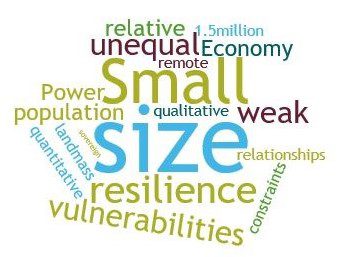 According to the World Bank, 50 countries are listed as small states: Antigua and Barbuda, Bahamas, Bahrain, Barbados, Belize, Bhutan, Botswana, Brunei, Cape Verde, Comoros, Cyprus, Djibouti, Dominica, Equatorial Guinea, Estonia, Fiji, Gabon, Gambia, Grenada, Guinea-Bissau, Guyana, Iceland, Jamaica, Kiribati, Lesotho, Maldives, Malta, Marshall Islands, Mauritius, Micronesia, Montenegro, Namibia, Nauru, Palau, Qatar, Saint Kitts and Nevis, Saint Lucia, Saint Vincent & the Grenadines, Samoa, San Marino, Sao Tome and Principe, Seychelles, Solomon Islands, Suriname, Swaziland, Timor-Leste, Tonga, Trinidad and Tobago, Tuvalu, and Vanuatu.
According to the World Bank, 50 countries are listed as small states: Antigua and Barbuda, Bahamas, Bahrain, Barbados, Belize, Bhutan, Botswana, Brunei, Cape Verde, Comoros, Cyprus, Djibouti, Dominica, Equatorial Guinea, Estonia, Fiji, Gabon, Gambia, Grenada, Guinea-Bissau, Guyana, Iceland, Jamaica, Kiribati, Lesotho, Maldives, Malta, Marshall Islands, Mauritius, Micronesia, Montenegro, Namibia, Nauru, Palau, Qatar, Saint Kitts and Nevis, Saint Lucia, Saint Vincent & the Grenadines, Samoa, San Marino, Sao Tome and Principe, Seychelles, Solomon Islands, Suriname, Swaziland, Timor-Leste, Tonga, Trinidad and Tobago, Tuvalu, and Vanuatu.
With no single definition of a small state, what criteria should we use to decide the smallness of a state? Territorial size? Economic power or potential? Security postures or military strength? Interaction with other states? Relative power indices?
There are two main approaches: quantitative and qualitative.
Quantitative definitions start with the criterion of absolute size – based on demographic, geographical, or economic factors – singly or in different combinations. Qualitative definitions start with relationships and with the assumption that the majority of relationships are among unequals. These approaches provide separate, but complementary, perspectives on the conduct of small state diplomacy.
Quantitative definition
Size is an important factor affecting how states deal with constraints on, and threats to, their sovereignty. Quantitative definitions look at absolute size in terms of demographic, geophysical, or economic conditions. As an example, the Commonwealth definition focuses on demographic size: Small states are sovereign countries with a population of 1.5 million people or fewer.
Using this definition, there are just over 30 small states in the Commonwealth. Yet within the Commonwealth, this list includes larger member countries such as Botswana, Jamaica, Lesotho, Namibia, and Papua New Guinea, as they share many of the same characteristics of small states (Commonwealth website). With limited resources, these states face unique development challenges, including limited economic diversification, remoteness, and isolation with accompanying high transportation costs, limited human and institutional capacity, susceptibility to natural disasters and environmental change, openness, and income volatility.
Categorisation based on quantitative definitions is often used in the context of development cooperation. It focuses the diplomatic exercise on the identification of the weaknesses and vulnerabilities of small states and on those measures and programmes that can help them cushion or avoid them. This approach is useful in directing attention to very small and vulnerable states. It can also highlight the concerns of small states with serious exposure to the effects of natural disasters (e.g. climate change in the case of the Alliance of Small Island States (AOSIS) group).
Qualitative definition
The qualitative approach concentrates on the perceptions that result from unequal relationships. It considers a much larger number of states as small, states whose sense of smallness is essentially circumstantial and subjective. It conceptualises the whole community of states ranging from the extremely small and weak (microstate) to the massive and most powerful (superpower).
Approached within this framework, the study of the diplomacy of small states includes a broader variety of foreign policy options and diplomatic methods, for example how small states deal with development and security, and how they seek to overcome their initial handicaps in specific circumstances. This approach allows a wider appreciation of the value and uses of the multilateral processes in small state diplomacy, beyond the value and use of these processes in development cooperation.
Characteristics of small states
In its small states overview, the World Bank notes: ‘To meet small states’ unique constraints, international development institutions need to develop innovative solutions tailored to address their interrelated development and financing issues. (World Bank)
Openness, insularity, resilience, weakness, and dependence are important factors influencing small state engagement in the international system, according to the Commonwealth Advisory Group report, A future for small states: overcoming vulnerability.
Small states are exposed to a high degree of economic openness often with a dependence on strategic imports (particularly food, energy, and industrial supplies); a dependence on a narrow range of exports or services; and susceptibility to external economic shocks. Consequently, vulnerability is often seen to be a key element in defining them.
A class-constructed definition (DiploFoundation small states course, 2010) encapsulates the ideas of qualitative and quantitative elements, characteristics, and the issue of vulnerability: A small state is one whose geographical, economic, or demographic conditions contribute to a perceived weakness and vulnerability in the international setting. A small state may be robust internally but is vulnerable externally.
These characteristics and vulnerabilities are often reflected in how small states conduct their diplomacy.
Learn more by taking Diplo’s certified online course Diplomacy of Small States.
Diplomacy of small states
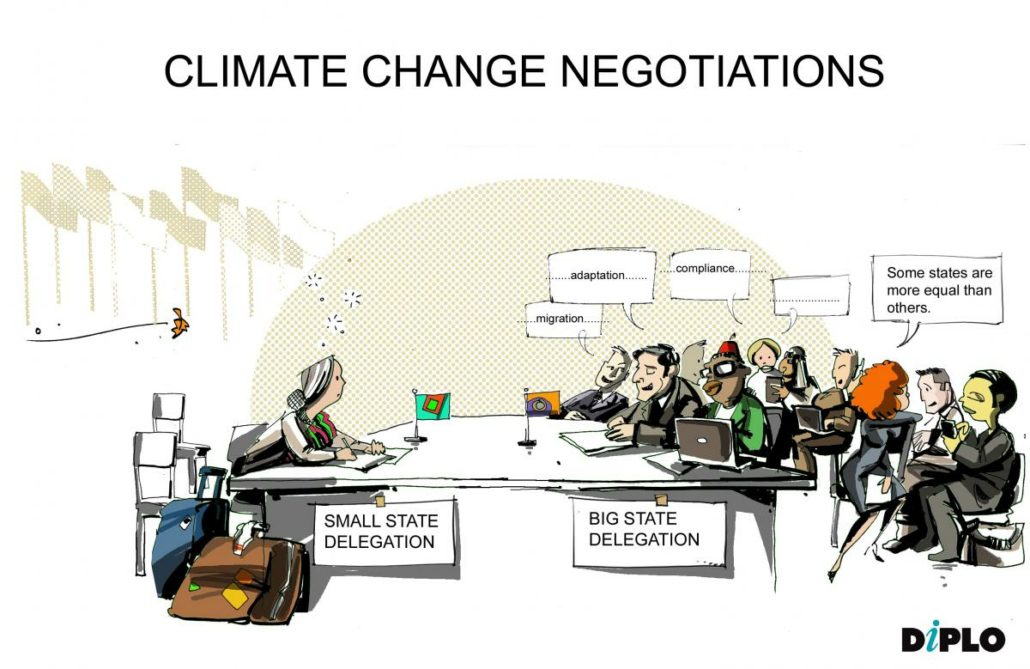
Although their limited resources can put smaller states in a weaker bargaining position in their interactions with larger states, this initial disadvantage can be reduced. This may require a reliance on collective solidarity and the rule of law, a strict focus on limited objectives, and the adoption of creative solutions. The role of small states in various multilateral negotiations confirms that small and cohesive groups can have an important effect. For example, the Neutral and Non-Aligned (N+N) countries in the Conference on Security and Cooperation in Europe (CSCE) process, the Alliance of Small Island States (AOSIS) in climate negotiations, and the Small and Vulnerable Economies (SVEs) group in the World Trade Organization DOHA round.
Although the many complex structures and processes of multilateral diplomacy can strain the resources of small states, they see the value of the multilateral approach in levelling the playing field. Small states can also exploit how their positions at the multilateral level can feed into bilateral relations.
Key issues for small states
However we define them, small states are represented on either side of the divide that exists in the international system between developed and developing countries. The binding elements arising from the constraints of smallness are a relevant factor in several important aspects, most notably those related to the environment, to trade and investment, and to security for small states in general.
Read more in the following sections on small states and the specific issues of economic development, security, and environment and climate change.
Issues: Economic development
In determining a small state’s economic vulnerabilities, key elements include economic openness and the link between smallness and remoteness, and connections between smallness and low levels of development. In economic diplomacy, the resilience that small states have to economic vulnerability and the way these vulnerabilities affect their bilateral and multilateral economic diplomacy is important to consider.
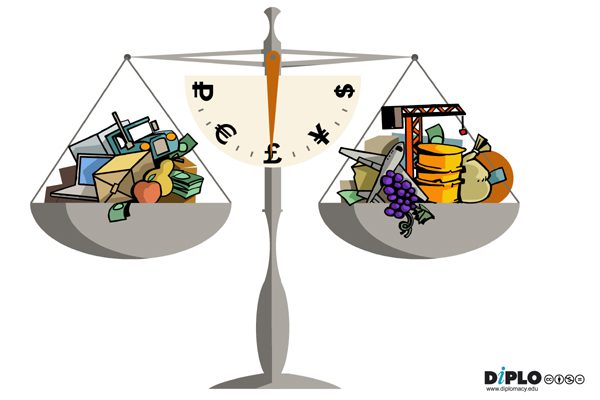
Briguglio, in the paper Economic Vulnerability, and Resilience: Concepts and Measurements, identifies four variables on an index of nurtured resiliency: good governance, macroeconomic stability, market reform, and social development.
Regional arrangements provide small states with the opportunity to insert their economies into larger economic frameworks. Regional economic integration provides a common platform through which members can better promote their collective interests with the rest of the international community and in multilateral arrangements, often advocating for a recognition of their specific challenges.
An important dilemma for many small states is how best to maintain a distinction between their demands for a preservation of preferences, based on the argument of special vulnerability, and the demands of other developing countries for retention of these preferences as an indispensable development tool. This is discussed further in the Commonwealth Secretariat/World Bank Joint Task Force on Small States Report: Small States: Meeting Challenges in the Global Economy.
Issues: Security
Small states have a more limited range of human and material resources to devote to security. They often lack the option of using force, either as a defensive or as a pre-emptive measure. Therefore, the diplomatic process becomes a more vital aspect of their approach to security than it may be for larger states. In common with all other states, the small state also has an interest in broad aspects of international peace, security, cooperation, prosperity building, and the protection of human rights.

This is reflected in the following statement in 2016 on the ongoing South China Sea dispute by Singapore Minister for Foreign Affairs, Dr Vivian Balakrishnan. Singapore is not a claimant state in the South China Sea. We take no position on the merits of the specific territorial claims. But as a small state, we do have a vital interest in and we have to strongly support the maintenance of a rules-based international order and to support the peaceful resolution of disputes, with full respect for legal and diplomatic processes. This is of vital importance for us that the integrity of international law and international agreements, such as the UN Convention on the Law of the Sea or UNCLOS for short, we must make sure that these agreements, these arrangements are not in any way undermined. As a small state, Singapore cannot accept that might is right.
Issues: Environment and Climate change

The necessity of mitigation and adaptation for small states is summarised in the following statement in 2011 by the St Lucia Minister for Sustainable Development.
The adaptation needs of our islands are many and they certainly transcend water and coastal zone issues as climate change will affect other critical sectors and systems such as food production, human settlements, critical infrastructure, financial services, human health, and terrestrial bio-diversity. Our islands may appear to be a fragile emerald necklace laid against the foil of the Azure Caribbean Sea but for us, they are everything and possess the assets that exist nowhere else in the world‘.
In 2017, the vulnerability of small states to external shocks was brought sharply into focus during the hurricane season in the Western Hemisphere and the devastating impact wrought on Antigua and Barbuda, Dominica, Puerto Rico, and the Florida Keys, among others.
What’s next?
Diplo addresses the diplomacy of small states through research, courses (online and face-to-face), policy discussions, and publications. We invite you to join us:
- Learn about small state diplomacy through Diplo’s certified online course on the Diplomacy of small states and the CD Multilateral Diplomacy project
- Join the online discussions on our blog; connect with bloggers and share your ideas and experiences
- Subscribe to DiploNews, Diplo’s bi-monthly e-newsletter
- Follow Diplo on Twitter or visit our Facebook page
- Get in touch with our team for any queries
Click to show page navigation!
